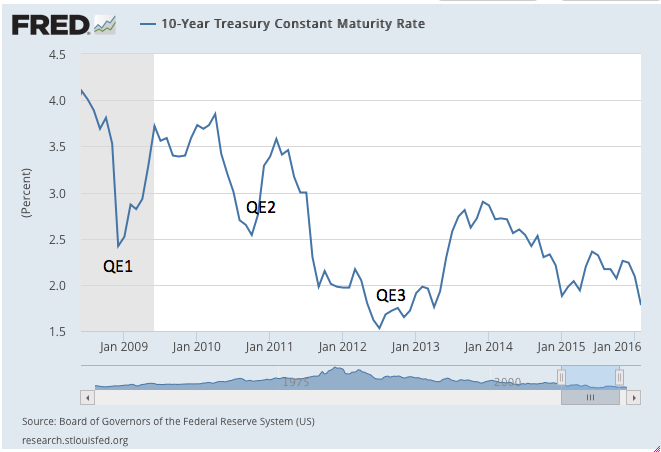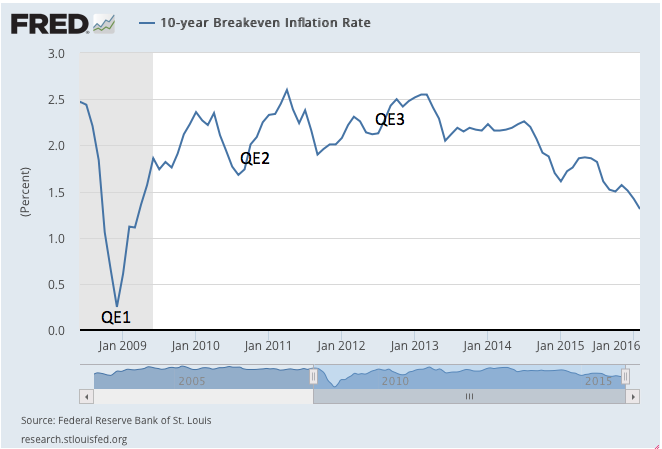While the ECB and Bank of Japan are exploring negative interest rates, the US Federal Reserve is preparing us for a slow and cautious increase in short-term interest rates. Long-term rates remain at very low levels and inflation expectations have come under pressure and also remain below what they were a few months or years ago.
And as this is going on while markets are trying to figure out if they like low or high interest rates. Even if they decide that they like low rates, are negative rates too low?
Within all these debates there seem to be an unusual amount of what economists call 'money illusion', or lack of understanding of the difference between nominal and real interest rates. This confusion, in my view, is partly motivated by the communication strategy of central banks that seems to obsess over the asymmetric nature of their inflation targets (for both the ECB and US Fed, inflation targets are defined as close to but below 2%) but are not clear enough on their final goals and timing.
How do we want interest rates to react to aggressive monetary policy? The common answer is that we want interest rates to go down. This is correct if we think in real terms: given inflation expectations (or actual inflation), we want interest rates to move down relative to those inflation levels.
But in some cases, in particular when inflation expectations are lower than what central banks would like them to be, the central bank, by being aggressive, is targeting higher inflation expectations and this could possibly lead to higher nominal (long-term) interest rates.
This is what happened in the three rounds of Quantitative Easing initiated by the US Federal Reserve. 10-Year interest rates went up, which was a signal of increasing inflation expectations (and even higher expectations of future real interest rates). This was seen as a success.


But the behavior of long-term interest rates, or inflation expectations in response to recent communications by central banks, has gone in the opposite direction. Long-term rates have come down (in particular in the Euro area). But don't we want lower interest rates? Isn't this the objective of massive purchases of long-term assets by central banks?
Yes, if we talk about real interest rates, but it's not obvious if we talk about nominal rates. What we really want is inflation expectations (and inflation) to increase and this is likely to keep long-term interest rates from falling so much.
Here is where I feel the central banks are not helping themselves. There are two mistakes they are making: in their messages about interest rates they do not distinguish clearly between nominal and real interest rates. What I want them to do is to send a message that real interest rates will remain low for an extended period of time to ensure higher inflation ahead and to ensure nominal interest rates increase in the future, so that we can escape the zero lower bound. By talking only about nominal interest rates, central banks are sending a signal that we will be stuck at the zero lower bound for a long time, a message that seems to be an admission of defeat. They cannot get out of this trap.
And this leads me to the second mistake of central banks: their asymmetric view of their inflation targets. In the US, inflation and core inflation are slowly moving towards the 2% target. This is seen by some as proof that the zero lower bound or the deflation trap has been defeated.
But this is the wrong reading. The fact that the Federal funds rate remains so close to 0% means that we are still at the zero lower bound or close enough to it and we should not be complacent with what we've achieved. The US Federal Reserve should only call it a success when the Federal funds rate is back to 3% or higher, safely away from 0%. But to get there we need to shoot for higher inflation, at least temporarily. The same message or one that's even stronger applies to the ECB.
In summary, success in escaping the zero lower bound should be judged by how central bank interest rates manage to move away from 0% not by how long they stay at 0%. Central banks are not communicating this clearly because of the fear that this would be interpreted as a message of future tightening of monetary policy. But by doing so they are hurting their ability to escape the deflation/lowflation trap.
